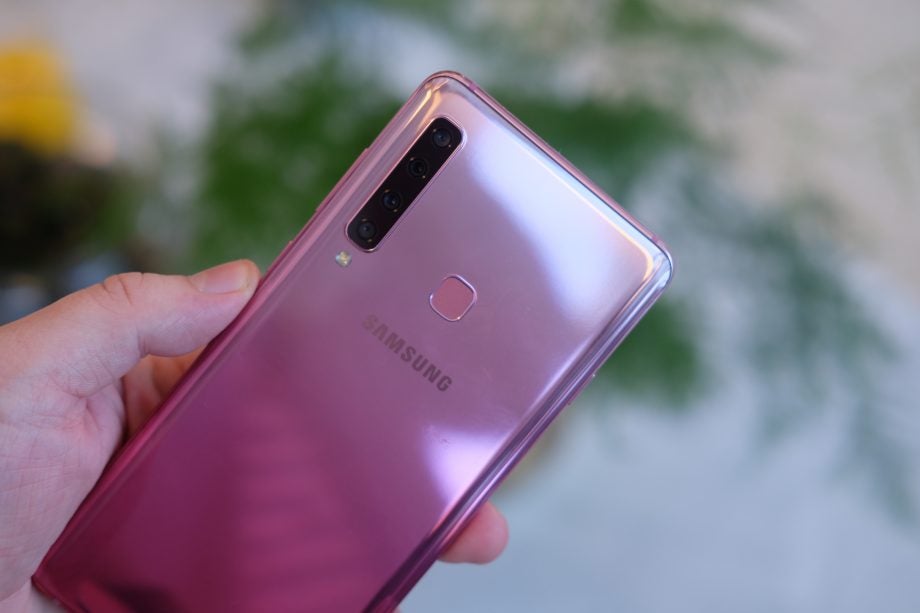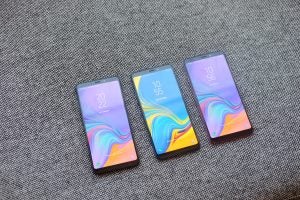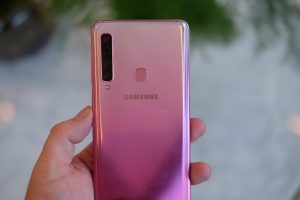Samsung Galaxy A9 first look Review
Samsung Galaxy A9 first look
Samsung's latest mid-range phone has promise

Verdict
Key Specifications
- Review Price: £549
- 6.3-inch FHD+ Immersive Display
- Snapdragon 660
- 6GB RAM
- 128GB storage
- Android 8.1
- 24MP main camera, f/1.7
- 5MP depth-sensor
- 8MP telephoto
- 10MP ultra-wide 120 degrees
- 24MP front camera f/2.0
- 3800 mAh
Samsung Galaxy A9 2018: How many cameras does a phone need?
Samsung’s high-end phone lineup is stacked in 2018, with both the Samsung Galaxy S9 and Samsung Galaxy Note 9 impressing. Its mid-range offerings are a little less enticing though, especially with impressive devices like the OnePlus 6 offering fantastic features for less than £500.
This is where the Samsung Galaxy A9 2018 comes in. For £549 you’re getting 128GB storage, plenty of RAM (6GB) and five cameras. That’s a lot of phone for your money.
Samsung Galaxy A9 2018 release date
There’s no official release date for the new A9 yet, however Samsung said it’ll be coming to the UK and other regions in November.
Samsung Galaxy A9 2018 price
Samsung Galaxy A9 will retail for £549 in the UK. This will be for the version with 128GB storage and 6GB RAM. This seems to be the only version of the device available. We’ll update this article once we have more information.

Helping the Samsung Galaxy A9 stand out from the crowded mid-range smartphone space is the eye-catching four-camera array on the back. Each sensor sits in a vertical pattern on the back and in many ways it looks a lot like the Huawei P20 Pro.
Related: Best smartphones
The main camera is a 24-megapixel sensor with an f/1.7 aperture. Below that sits a depth-sensing 5-megapixel camera that focusses solely on gathering depth information for the Live Focus bokeh feature. Next up is an 8-megapixel telephoto sensor that’ll give you improved quality when you’re zooming – or so Samsung says – and finally an ultra-wide 10-megapixel sensor. The last camera gives you a much wider, 120-degree view and allows much more stuff crammed into the shot. LG used something similar on the LG G7 and it worked well there.
There’s also a 24-megapixel camera round the front with an f/2.0 aperture.

Switching between this selection of cameras is easy enough in the simple camera app and it was quick to move through all the differing options.
I’ll have to spend a lot more time with the phone to judge whether or not this many cameras are needed and just how good the quality of the shots are, but it was easy to notice the wide range of different colours between each cameras. The telephoto, for example, had a warm, orange glow, with the ultra-wide being much whiter.
Related: Best Android phones

Cameras aside, there’s plenty more to like here. Powering the phone is a Snapdragon 660, paired with an impressive 6GB RAM. That’s more than either the Google Pixel 3 or Pixel 3 XL. You’ve also got 128GB storage plus microSD expansion. Topping off the package is a sizeable 3800mAh battery.
On the front is a large 6.3-inch FHD+ panel with a slim bezel and no notch. Samsung calls this an ‘Immersive Display’ rather than an ‘Infinity Display’ (the one you’ll find on the Galaxy S9 Plus) as there’s no curvature to the sides. It’s certainly not as flashy as those other screens, but it still has good vibrancy and punchy colours.
The actual design of the phone feels – and looks – very different to other Samsung devices. It’s made of a ‘glass-like’ material that feels kind of plasticky to the touch, but it comes in a fantastical array of bright, sparkly colours. There’s a vibrant pink and a blue that’s similar to the Twilight colour of the Huawei P20. They really do stand out and look great. I’m less convinced about the look of the cameras on the back, though.
Opening impressions
For £549, the Samsung Galaxy A9 sits just above the OnePlus 6 – and I am yet to be convinced it can properly compete with that excellent device. Yet you’re still getting a lot here and it’ll be a unique product if all the cameras work well.
How we test phones
We test every mobile phone we review thoroughly. We use industry standard tests to compare features properly and we use the phone as our main device over the review period. We’ll always tell you what we find and we never, ever, accept money to review a product.


